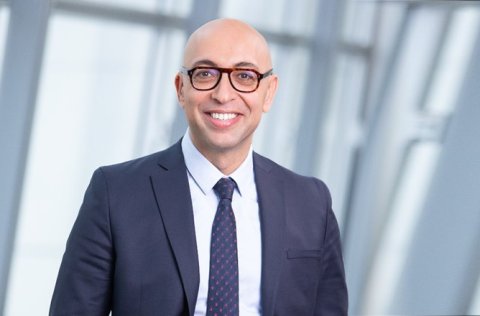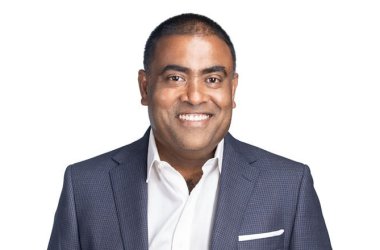CNME Editor Mark Forker sat down with Wassim Chourbaji, President, MEA & SVP of Government Affairs EMEA, at Qualcomm, to find out more about how the rapid digital transformation underway across the Middle East is mirrored by Qualcomm’s own transformation as a company.

Wassim Chourbaji has been a permanent fixture at Qualcomm since 2006.
He holds dual roles for the US wireless technology behemoth.
In addition to being Qualcomm President across the MEA region, he is also the Senior Vice President for Government Affairs for Europe, Middle East, and Africa at Qualcomm.
An engineer by trade, over the years Chourbaji has cultivated himself into a leading technology and political strategist, and he oversees Qualcomm’s public policy, regulatory strategy, and government relations across the region he serves.
In a candid conversation with CNME during Mobile World Congress in Barcelona, Chourbaji outlined how Qualcomm was undergoing its own transformation and how that marries itself well with seismic transformation that is occurring across the entire Middle East region.
He began our discussion by highlighting his role at Qualcomm, and stressing that his mandate is clear, and that is to create partnerships.
“Look, I have two jobs at Qualcomm. I’m the Head of Government Affairs for the EMEA region, and that role requires me to engage with government stakeholders on regulatory issues, and bring new technologies to Europe. I want to develop partnerships across different regions in an effort to cultivate an ecosystem in which disruptive technologies can be adopted within a regulated environment. I was also recently nominated as the President for the MEA region – and the main mandate that I have been given is to partner with countries pursuing transformation programs all across the region, as they look to harness the capabilities of AI and connectivity with 5G,” said Chourbaji.
He signalled the ambitious economic transformation programs being pursued by the UAE and Saudi Arabia, and outlined that he doesn’t view countries as markets, but instead views countries like the UAE and others as ‘partners’.
“The regional transformation across the Middle East intersects with our own transformation at Qualcomm, which is from being a smartphone-centric company to an entity that does intelligence everywhere, from the edge to the cloud, automotive, XR, smartphone and PCs. All across the board we are infusing intelligence into our products. I view countries as partners, and when two partners are transforming then this creates great opportunities. If you look at the Middle East region for example, you have two countries in Saudi Arabia and the UAE in particular, who both have incredibly ambitious plans to become global leaders in innovation and technology, and that is evidenced by their willingness to invest significantly in new technologies,” said Chourbaji.
As referenced above, a key part of Chorbaji’s day-to-day role is to develop Qualcomm’s public policy and regulatory strategy, and that job sees him work very closely with governments all over the MEA region.
However, when it comes to regulating technology, especially AI, it isn’t exactly black and white, and it is a challenge.
Some argue too much regulation will stifle innovation, whilst others are cognisant that we need to have guardrails and frameworks in place to ensure AI is used ethically and responsibly.
Chourbaji outlined how at Qualcomm, when it comes to developing new technologies, they adopt their concept of ‘Trust by Design’.
“At Qualcomm, we create foundational technology, so when you do that then you have a responsibility with the technology you are developing. When we started creating 3G, and evolved that to 4G, and 5G, and we went from connecting people to connecting cars, but the surface of cyberattacks were increasing, so connecting cars was viewed by many as dangerous. So, I think that any foundational technology that you are bringing to market and that is fundamentally changing economies and society, then it goes without saying that you need to be very, very careful about how you design it, and develop it. At Qualcomm, we call it ‘Trust by Design’. We have a responsibility to ensure that our technologies are used ethically and responsibility. If you don’t want your data to be shared, and you want to be keep it in the palm of your hand in your device, that’s what we call on device AI, and we have enabled on device AI, and that’s a perfect example of how we deliver privacy and security by design. If you want to share other information back to the cloud then you can do that. That’s one element of our trust by design concept from a technology perspective,” said Chourbaji.
Qualcomm’s President for MEA added that a second layer of their Trust by Design mantra lies in their engagement with governments across the region.
He highlighted how they can leverage their expertise to ensure that governments implement regulations and policies that don’t suppress innovation, but at the same time put the protections in place that ensure the technology is being deployed in a safe manner.
“Obviously, governments are in the business of creating policies designed to incentivise innovation, and drive economic growth. In addition to this, they want to promote technology for good, through greater inclusivity and deploying technologies into industries such as healthcare to transform patient outcomes and experiences. Each region and each country have its own rules, so engaging with governments in a bid to better understand what their concerns and challenges are is important, and they need partners like Qualcomm to explain how certain challenges they face can be addressed in a particular way, we can provide that knowledge and expertise from a technological viewpoint. If governments create a regulation that will harm the development of that innovation then we can highlight that to them, and iron out that friction between regulation and innovation, and our engagement with governments has been very constructive in relation to the balance that needs to be struck between innovation and regulation. We are in a position where they look at us and say that we are an objective partner. It’s an ecosystem approach that we adopt, and we want plenty of partners to come in to contribute. We know the technology, and they know what their citizens want. We work well together to achieve the outcomes and objectives that is mutually beneficial to both parties,” said Chourbaji.
Qualcomm opened their regional office in Dubai in 2008, and under the guidance of Jay Srage achieved a lot of success, but as Chourbaji pointed out back then the company was focused on smartphones, now the company has a completely different vision for the region, and cited their partnership with the ALLaM PC in Saudi Arabia as a shining example of their new approach.
“When Qualcomm was there in 2018, the team, which was led by Jay Srage, and he did a great job, but we were a smartphone company. Our objective was to sell as many Snapdragon smart devices in the UAE, and the KSA. We looked at these countries as markets, but what I am describing here with Qualcomm’s new vision is a completely different thing. How can we partner to create something new like a world first for example? ALLaM is the large language model of Saudi Arabia, and we worked with them on an ALLaM PC, it doesn’t exist elsewhere, and this LLM is built in offline, and users can use it as an assistant for their daily tasks. It is a truly transformative tool. When you look at this AllaM device by Qualcomm, this is a perfect illustration of co-development and co-innovation, this is not us bringing a product to the market, and saying we want to sell 100 million devices. The UAE and the KSA want to be leaders in the technology and innovation space, and they are investing accordingly. Qualcomm is a global technology leader, and we will continue to be a leader in this space, and there is a good synergy between us and the countries pursuing changes across the Middle East region. We like partners, whether that partner is a country, or a leading automaker like BMW, or a smart glass leading provider like Meta, it is all the same to us,” said Chourbaji.
Chourbaji said the Qualcomm is enabling AI PCs right across the board, and sees the ALLaM PC as more than just a PC, describing it as a platform.
He highlighted the importance of Qualcomm’s AI Hub, and the partnership it has cultivated with Aramco, and Saudi Arabia’s Research, Development, and Innovation Authority (RDIA) to launched their Design in Saudi Arabia (DISA), an incubator program to support start-ups adopting AI.
“When it comes to the ALLaM PC, it is much more than just a PC, it is a platform. We went further and put ALLaM on our AI hub, which allows app developers to select ALLaM and make applications and create services that are useful for the KSA marketplace. In addition to this, in partnership with Aramco, we have created an ecosystem called the Design in Saudi Arabia (DISA) program, which allows start-ups to come in and use the AI Hub. When you’re in the business of large-scale transformation it is simply not enough to leave it to 1, or 2 large organisations to drive that growth and foster that change, you need to build an ecosystem, and you need to enable the ecosystem to exist, and the ecosystem needs to be comprised of big, and small companies. You need new ideas coming from the small players, and you need investment from the large entities, which ultimately creates new opportunities for others. In order to do all of this at scale then you need an open platform that enables everyone to plug-in, innovate on top of each other. This is real transformation,” said Chourbaji.
Chourbaji concluded a wonderful exchange by highlighting how its engineering background, which is embedded in its DNA, and its desire to create new partnership and ecosystems ultimately differentiates the US semiconductor giant to other market rivals.
“I’ve spent 20 years at Qualcomm, it is an engineering company first and foremost, but innovation is in our DNA. We drive and create new markets and ecosystems, and what really differentiates us from others is the fact that we love to work in ecosystems, and we love to have partners. We strive for others to thrive. We help create ecosystems, and as long as the ecosystems grow, then we grow, so it’s a win-win. By 2029, 50% of Qualcomm’s revenue will be generated by smartphones, and the rest will be generated by XR, automotive and Industrial IoT, so the company has set a plan to transform. When you look at all these other verticals, there are so many new opportunities to create new ecosystems, and develop new partnerships to innovate on new concepts and ideas. It truly is an exciting time for the region, and for Qualcomm,” said Chourbaji.





